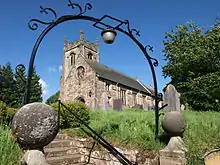St Peter's Church, Snelston
St Peter's Church, Snelston is a Grade II* listed parish church in the Church of England[3]: 319 in Snelston, Derbyshire.
| St Peter’s Church, Snelston | |
|---|---|
 St Peter’s Church, Snelston | |
| 52°59′14.15″N 1°46′11.33″W | |
| Location | Snelston, Derbyshire |
| Country | England |
| Denomination | Church of England |
| History | |
| Dedication | St Peter |
| Architecture | |
| Heritage designation | Grade II* listed[1] |
| Administration | |
| Province | Canterbury |
| Diocese | Derby |
| Archdeaconry | Derby |
| Deanery | Ashbourne[2] |
| Parish | Snelston |
History
The church dates from the early 15th century. The main body of the church was rebuilt in 1825, and there were further major alterations in 1907 by Charles Hodgson Fowler paid for by Mrs. Henry Stanton.[4] The nave was lengthened westwards by 10 feet (3.0 m) when a new western doorway surmounted by a niche holding the figure of St Peter was inserted. A larger arch was built at the entrance to the chancel and a carved oak screen provided. The chancel was re-floored with black and white marble and a new reredos of oak and alabaster inserted. A new choir vestry was provided. The contractor was Messrs Bowman and Sons of Stamford. The decoration work was carried out by Mr. Ashforth of Lincoln, and Mr. Bridgeman of Lichfield. The opening service took place on 16 October 1907 attended by the Bishop of Southwell.
The church was subjected to an unhappy dispute between the Squire and Parson which started in 1916. In 1915 the Revd. J.M. Trevor was inducted as incumbent. Mrs. Stanton from Snelston Hall, the servants and tenants were regular attenders at the services, and Mrs. Stanton conducted the choir. On the last Sunday in 1916, the Rector returning from 3 weeks of illness, was notified by the organist that Mrs. Stanton did not want the psalms to be sung at Sunday evening service. He said he would leave the matter to the congregation, but as there were a good number present when the service started, he decided that the psalms would be sung. Next morning he received a letter from Mrs Stanton who was annoyed by his decision. She cut off the subscription of £10 towards the organist's salary. This culminated in the Stantons and retinue no longer attending, and the families of the village stayed away too.[5] In a further escalation, the male members of the choir, who were employees of the Squire, no longer attended, and the electric light, provided by the plant at Snelston Hall, was cut off. The Rector was denied access to keys kept at the Hall which gave access to the church clock and belfry, until a letter from the Bishop's lawyer arrived. Things were still unresolved when the new wardens were appointed in April 1921.[6]
Organ
A pipe organ was built by Gray & Davison in 1877. A specification of the organ can be found on the National Pipe Organ Register.[7]
Bells
The church tower contains 3 bells, One of 1635 by George Oldfield, another of 1755 by Thomas Hedderley, and the last of 1688 by George Oldfield.[8] The bells were re-hung in 1907.
References
- Historic England, "Church of St Peter (1109768)", National Heritage List for England, retrieved 8 January 2017
- "St Peter, Snelston". A Church Near You. The Church of England. Retrieved 8 January 2017.
- Pevsner, Nikolaus; Williamson, Elizabeth (1979). The Buildings of England. Derbyshire. Penguin Books Limited. ISBN 0140710086.
- "Restoration of Snelston Church". Derbyshire Advertiser and Journal. England. 25 October 1907. Retrieved 8 January 2017 – via British Newspaper Archive.
- "Who shall rule in Snelston - Squire or Rector?". Derbyshire Daily Telegraph. England. 30 March 1921. Retrieved 8 January 2017 – via British Newspaper Archive.
- "Snelston Church Dispute". Derbyshire Daily Telegraph. England. 21 April 1921. Retrieved 8 January 2017 – via British Newspaper Archive.
- "NPOR [D06295]". National Pipe Organ Register. British Institute of Organ Studies. Retrieved 8 January 2017.
- "Snelston, Derbys. S Peter". Dove's Guide for Church Bell Ringers. Dovemaster. 6 December 2006. Retrieved 8 January 2017.